Human Trafficking: An Ethical Analysis - SOC120 Assignment
VerifiedAdded on 2022/10/04
|8
|2058
|14
Essay
AI Summary
This essay explores the multifaceted issue of human trafficking, examining its global prevalence and the unethical practices it entails, including forced labor, sexual exploitation, and organ harvesting. The essay delves into various ethical theories, such as deontology, utilitarianism, ethical egoism, and emotivism, to analyze the morality of human trafficking, demonstrating how these theories condemn the practice. It highlights the vulnerability of victims, particularly women, children, and young girls, and the significant financial scale of the human trafficking industry. Furthermore, the essay underscores the importance of international cooperation, strict laws, and public awareness to combat this crime against humanity, emphasizing that no ethical theory supports human trafficking as an acceptable activity. The essay concludes by reinforcing the need for societal and governmental action to eradicate human trafficking and create a safer world.
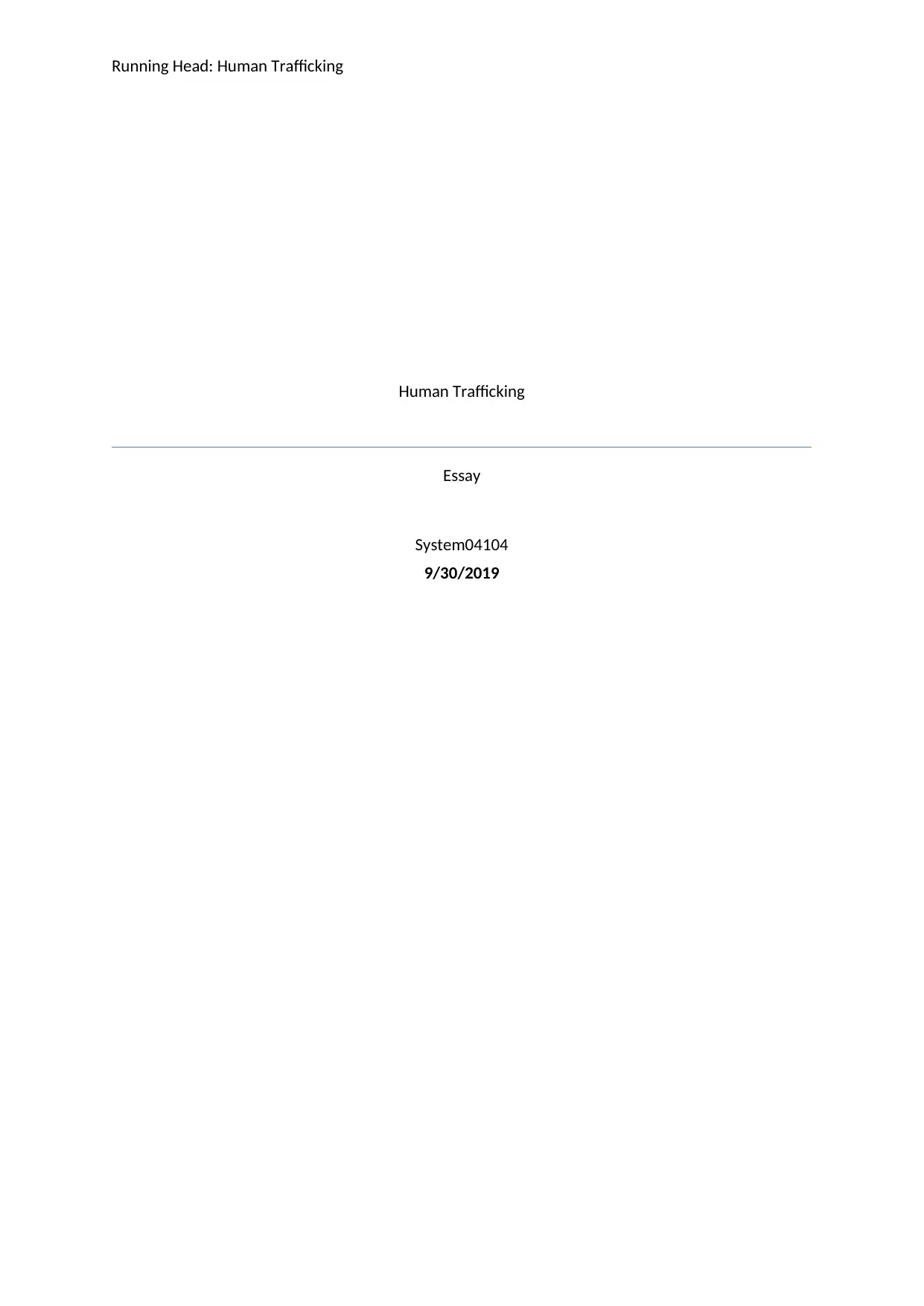
Running Head: Human Trafficking
Human Trafficking
Essay
System04104
9/30/2019
Human Trafficking
Essay
System04104
9/30/2019
Paraphrase This Document
Need a fresh take? Get an instant paraphrase of this document with our AI Paraphraser
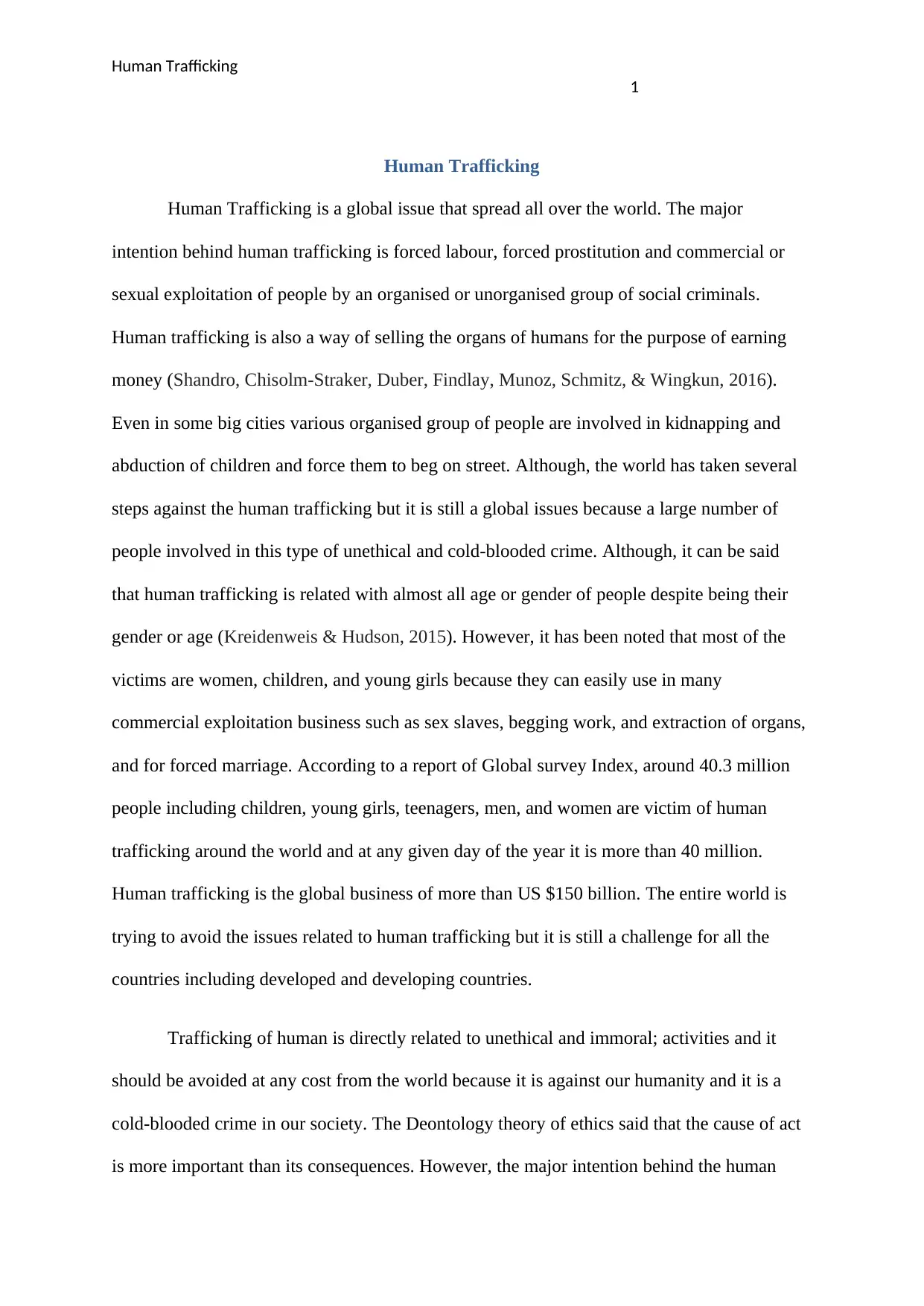
Human Trafficking
1
Human Trafficking
Human Trafficking is a global issue that spread all over the world. The major
intention behind human trafficking is forced labour, forced prostitution and commercial or
sexual exploitation of people by an organised or unorganised group of social criminals.
Human trafficking is also a way of selling the organs of humans for the purpose of earning
money (Shandro, Chisolm-Straker, Duber, Findlay, Munoz, Schmitz, & Wingkun, 2016).
Even in some big cities various organised group of people are involved in kidnapping and
abduction of children and force them to beg on street. Although, the world has taken several
steps against the human trafficking but it is still a global issues because a large number of
people involved in this type of unethical and cold-blooded crime. Although, it can be said
that human trafficking is related with almost all age or gender of people despite being their
gender or age (Kreidenweis & Hudson, 2015). However, it has been noted that most of the
victims are women, children, and young girls because they can easily use in many
commercial exploitation business such as sex slaves, begging work, and extraction of organs,
and for forced marriage. According to a report of Global survey Index, around 40.3 million
people including children, young girls, teenagers, men, and women are victim of human
trafficking around the world and at any given day of the year it is more than 40 million.
Human trafficking is the global business of more than US $150 billion. The entire world is
trying to avoid the issues related to human trafficking but it is still a challenge for all the
countries including developed and developing countries.
Trafficking of human is directly related to unethical and immoral; activities and it
should be avoided at any cost from the world because it is against our humanity and it is a
cold-blooded crime in our society. The Deontology theory of ethics said that the cause of act
is more important than its consequences. However, the major intention behind the human
1
Human Trafficking
Human Trafficking is a global issue that spread all over the world. The major
intention behind human trafficking is forced labour, forced prostitution and commercial or
sexual exploitation of people by an organised or unorganised group of social criminals.
Human trafficking is also a way of selling the organs of humans for the purpose of earning
money (Shandro, Chisolm-Straker, Duber, Findlay, Munoz, Schmitz, & Wingkun, 2016).
Even in some big cities various organised group of people are involved in kidnapping and
abduction of children and force them to beg on street. Although, the world has taken several
steps against the human trafficking but it is still a global issues because a large number of
people involved in this type of unethical and cold-blooded crime. Although, it can be said
that human trafficking is related with almost all age or gender of people despite being their
gender or age (Kreidenweis & Hudson, 2015). However, it has been noted that most of the
victims are women, children, and young girls because they can easily use in many
commercial exploitation business such as sex slaves, begging work, and extraction of organs,
and for forced marriage. According to a report of Global survey Index, around 40.3 million
people including children, young girls, teenagers, men, and women are victim of human
trafficking around the world and at any given day of the year it is more than 40 million.
Human trafficking is the global business of more than US $150 billion. The entire world is
trying to avoid the issues related to human trafficking but it is still a challenge for all the
countries including developed and developing countries.
Trafficking of human is directly related to unethical and immoral; activities and it
should be avoided at any cost from the world because it is against our humanity and it is a
cold-blooded crime in our society. The Deontology theory of ethics said that the cause of act
is more important than its consequences. However, the major intention behind the human
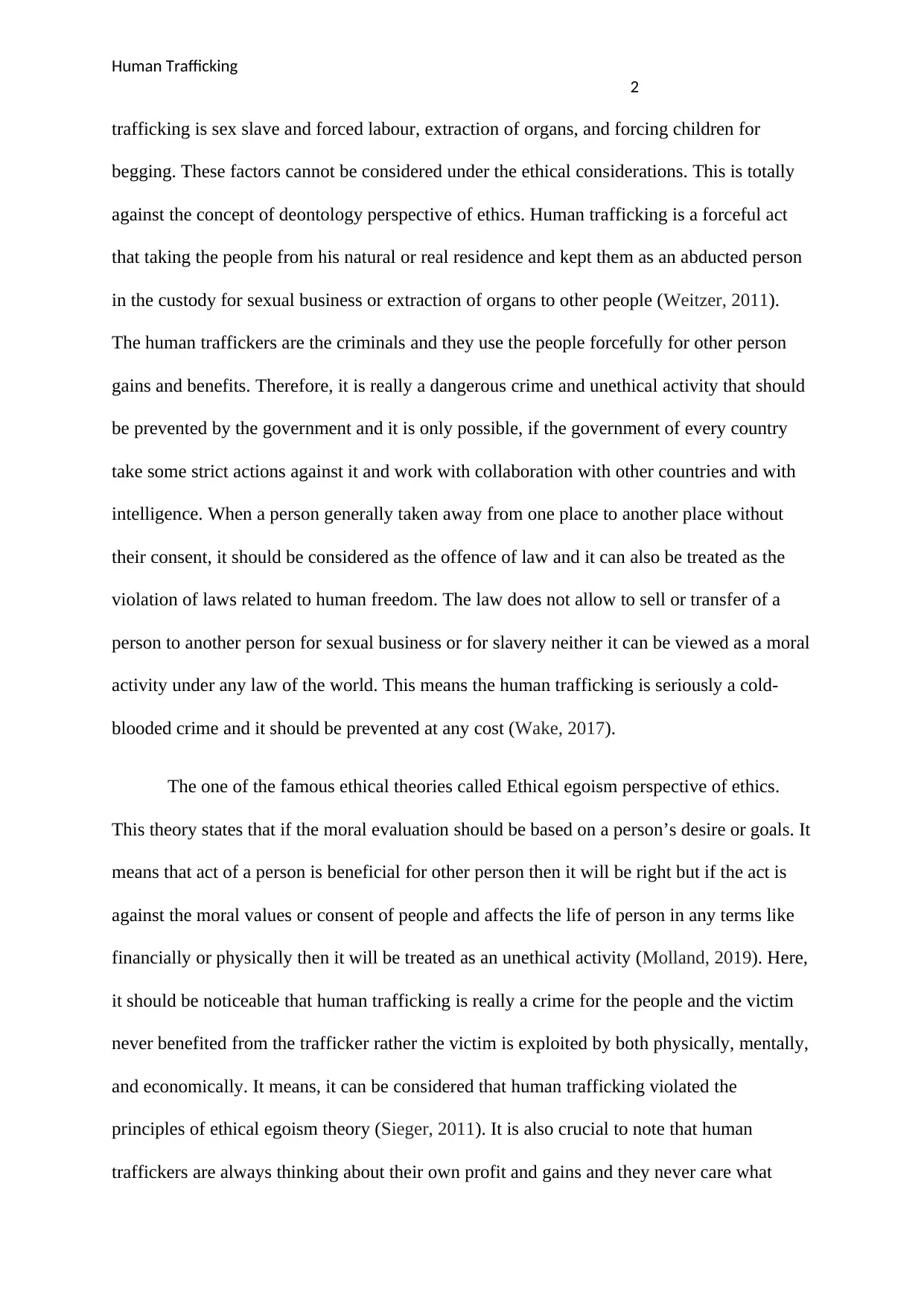
Human Trafficking
2
trafficking is sex slave and forced labour, extraction of organs, and forcing children for
begging. These factors cannot be considered under the ethical considerations. This is totally
against the concept of deontology perspective of ethics. Human trafficking is a forceful act
that taking the people from his natural or real residence and kept them as an abducted person
in the custody for sexual business or extraction of organs to other people (Weitzer, 2011).
The human traffickers are the criminals and they use the people forcefully for other person
gains and benefits. Therefore, it is really a dangerous crime and unethical activity that should
be prevented by the government and it is only possible, if the government of every country
take some strict actions against it and work with collaboration with other countries and with
intelligence. When a person generally taken away from one place to another place without
their consent, it should be considered as the offence of law and it can also be treated as the
violation of laws related to human freedom. The law does not allow to sell or transfer of a
person to another person for sexual business or for slavery neither it can be viewed as a moral
activity under any law of the world. This means the human trafficking is seriously a cold-
blooded crime and it should be prevented at any cost (Wake, 2017).
The one of the famous ethical theories called Ethical egoism perspective of ethics.
This theory states that if the moral evaluation should be based on a person’s desire or goals. It
means that act of a person is beneficial for other person then it will be right but if the act is
against the moral values or consent of people and affects the life of person in any terms like
financially or physically then it will be treated as an unethical activity (Molland, 2019). Here,
it should be noticeable that human trafficking is really a crime for the people and the victim
never benefited from the trafficker rather the victim is exploited by both physically, mentally,
and economically. It means, it can be considered that human trafficking violated the
principles of ethical egoism theory (Sieger, 2011). It is also crucial to note that human
traffickers are always thinking about their own profit and gains and they never care what
2
trafficking is sex slave and forced labour, extraction of organs, and forcing children for
begging. These factors cannot be considered under the ethical considerations. This is totally
against the concept of deontology perspective of ethics. Human trafficking is a forceful act
that taking the people from his natural or real residence and kept them as an abducted person
in the custody for sexual business or extraction of organs to other people (Weitzer, 2011).
The human traffickers are the criminals and they use the people forcefully for other person
gains and benefits. Therefore, it is really a dangerous crime and unethical activity that should
be prevented by the government and it is only possible, if the government of every country
take some strict actions against it and work with collaboration with other countries and with
intelligence. When a person generally taken away from one place to another place without
their consent, it should be considered as the offence of law and it can also be treated as the
violation of laws related to human freedom. The law does not allow to sell or transfer of a
person to another person for sexual business or for slavery neither it can be viewed as a moral
activity under any law of the world. This means the human trafficking is seriously a cold-
blooded crime and it should be prevented at any cost (Wake, 2017).
The one of the famous ethical theories called Ethical egoism perspective of ethics.
This theory states that if the moral evaluation should be based on a person’s desire or goals. It
means that act of a person is beneficial for other person then it will be right but if the act is
against the moral values or consent of people and affects the life of person in any terms like
financially or physically then it will be treated as an unethical activity (Molland, 2019). Here,
it should be noticeable that human trafficking is really a crime for the people and the victim
never benefited from the trafficker rather the victim is exploited by both physically, mentally,
and economically. It means, it can be considered that human trafficking violated the
principles of ethical egoism theory (Sieger, 2011). It is also crucial to note that human
traffickers are always thinking about their own profit and gains and they never care what
⊘ This is a preview!⊘
Do you want full access?
Subscribe today to unlock all pages.

Trusted by 1+ million students worldwide
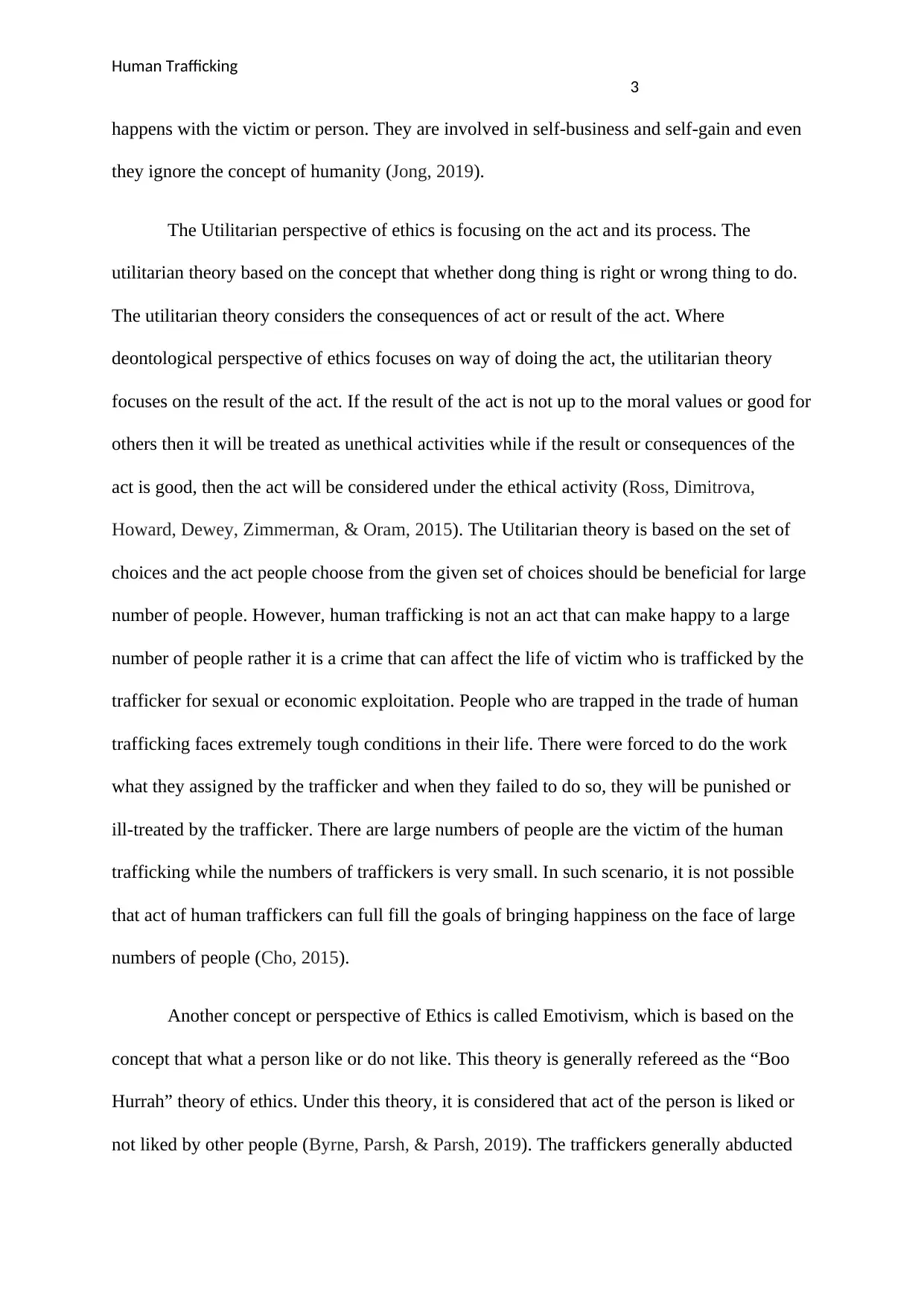
Human Trafficking
3
happens with the victim or person. They are involved in self-business and self-gain and even
they ignore the concept of humanity (Jong, 2019).
The Utilitarian perspective of ethics is focusing on the act and its process. The
utilitarian theory based on the concept that whether dong thing is right or wrong thing to do.
The utilitarian theory considers the consequences of act or result of the act. Where
deontological perspective of ethics focuses on way of doing the act, the utilitarian theory
focuses on the result of the act. If the result of the act is not up to the moral values or good for
others then it will be treated as unethical activities while if the result or consequences of the
act is good, then the act will be considered under the ethical activity (Ross, Dimitrova,
Howard, Dewey, Zimmerman, & Oram, 2015). The Utilitarian theory is based on the set of
choices and the act people choose from the given set of choices should be beneficial for large
number of people. However, human trafficking is not an act that can make happy to a large
number of people rather it is a crime that can affect the life of victim who is trafficked by the
trafficker for sexual or economic exploitation. People who are trapped in the trade of human
trafficking faces extremely tough conditions in their life. There were forced to do the work
what they assigned by the trafficker and when they failed to do so, they will be punished or
ill-treated by the trafficker. There are large numbers of people are the victim of the human
trafficking while the numbers of traffickers is very small. In such scenario, it is not possible
that act of human traffickers can full fill the goals of bringing happiness on the face of large
numbers of people (Cho, 2015).
Another concept or perspective of Ethics is called Emotivism, which is based on the
concept that what a person like or do not like. This theory is generally refereed as the “Boo
Hurrah” theory of ethics. Under this theory, it is considered that act of the person is liked or
not liked by other people (Byrne, Parsh, & Parsh, 2019). The traffickers generally abducted
3
happens with the victim or person. They are involved in self-business and self-gain and even
they ignore the concept of humanity (Jong, 2019).
The Utilitarian perspective of ethics is focusing on the act and its process. The
utilitarian theory based on the concept that whether dong thing is right or wrong thing to do.
The utilitarian theory considers the consequences of act or result of the act. Where
deontological perspective of ethics focuses on way of doing the act, the utilitarian theory
focuses on the result of the act. If the result of the act is not up to the moral values or good for
others then it will be treated as unethical activities while if the result or consequences of the
act is good, then the act will be considered under the ethical activity (Ross, Dimitrova,
Howard, Dewey, Zimmerman, & Oram, 2015). The Utilitarian theory is based on the set of
choices and the act people choose from the given set of choices should be beneficial for large
number of people. However, human trafficking is not an act that can make happy to a large
number of people rather it is a crime that can affect the life of victim who is trafficked by the
trafficker for sexual or economic exploitation. People who are trapped in the trade of human
trafficking faces extremely tough conditions in their life. There were forced to do the work
what they assigned by the trafficker and when they failed to do so, they will be punished or
ill-treated by the trafficker. There are large numbers of people are the victim of the human
trafficking while the numbers of traffickers is very small. In such scenario, it is not possible
that act of human traffickers can full fill the goals of bringing happiness on the face of large
numbers of people (Cho, 2015).
Another concept or perspective of Ethics is called Emotivism, which is based on the
concept that what a person like or do not like. This theory is generally refereed as the “Boo
Hurrah” theory of ethics. Under this theory, it is considered that act of the person is liked or
not liked by other people (Byrne, Parsh, & Parsh, 2019). The traffickers generally abducted
Paraphrase This Document
Need a fresh take? Get an instant paraphrase of this document with our AI Paraphraser
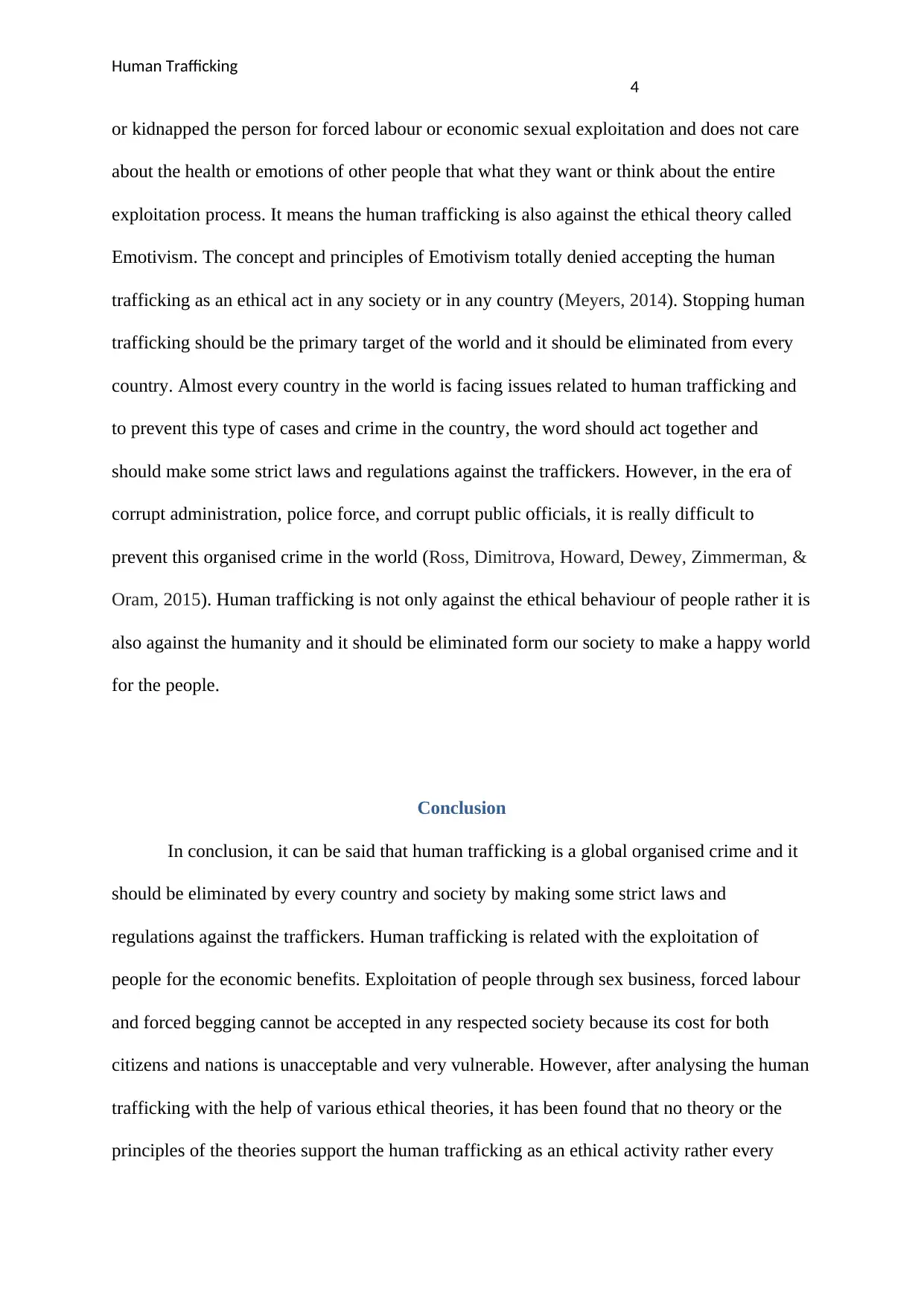
Human Trafficking
4
or kidnapped the person for forced labour or economic sexual exploitation and does not care
about the health or emotions of other people that what they want or think about the entire
exploitation process. It means the human trafficking is also against the ethical theory called
Emotivism. The concept and principles of Emotivism totally denied accepting the human
trafficking as an ethical act in any society or in any country (Meyers, 2014). Stopping human
trafficking should be the primary target of the world and it should be eliminated from every
country. Almost every country in the world is facing issues related to human trafficking and
to prevent this type of cases and crime in the country, the word should act together and
should make some strict laws and regulations against the traffickers. However, in the era of
corrupt administration, police force, and corrupt public officials, it is really difficult to
prevent this organised crime in the world (Ross, Dimitrova, Howard, Dewey, Zimmerman, &
Oram, 2015). Human trafficking is not only against the ethical behaviour of people rather it is
also against the humanity and it should be eliminated form our society to make a happy world
for the people.
Conclusion
In conclusion, it can be said that human trafficking is a global organised crime and it
should be eliminated by every country and society by making some strict laws and
regulations against the traffickers. Human trafficking is related with the exploitation of
people for the economic benefits. Exploitation of people through sex business, forced labour
and forced begging cannot be accepted in any respected society because its cost for both
citizens and nations is unacceptable and very vulnerable. However, after analysing the human
trafficking with the help of various ethical theories, it has been found that no theory or the
principles of the theories support the human trafficking as an ethical activity rather every
4
or kidnapped the person for forced labour or economic sexual exploitation and does not care
about the health or emotions of other people that what they want or think about the entire
exploitation process. It means the human trafficking is also against the ethical theory called
Emotivism. The concept and principles of Emotivism totally denied accepting the human
trafficking as an ethical act in any society or in any country (Meyers, 2014). Stopping human
trafficking should be the primary target of the world and it should be eliminated from every
country. Almost every country in the world is facing issues related to human trafficking and
to prevent this type of cases and crime in the country, the word should act together and
should make some strict laws and regulations against the traffickers. However, in the era of
corrupt administration, police force, and corrupt public officials, it is really difficult to
prevent this organised crime in the world (Ross, Dimitrova, Howard, Dewey, Zimmerman, &
Oram, 2015). Human trafficking is not only against the ethical behaviour of people rather it is
also against the humanity and it should be eliminated form our society to make a happy world
for the people.
Conclusion
In conclusion, it can be said that human trafficking is a global organised crime and it
should be eliminated by every country and society by making some strict laws and
regulations against the traffickers. Human trafficking is related with the exploitation of
people for the economic benefits. Exploitation of people through sex business, forced labour
and forced begging cannot be accepted in any respected society because its cost for both
citizens and nations is unacceptable and very vulnerable. However, after analysing the human
trafficking with the help of various ethical theories, it has been found that no theory or the
principles of the theories support the human trafficking as an ethical activity rather every
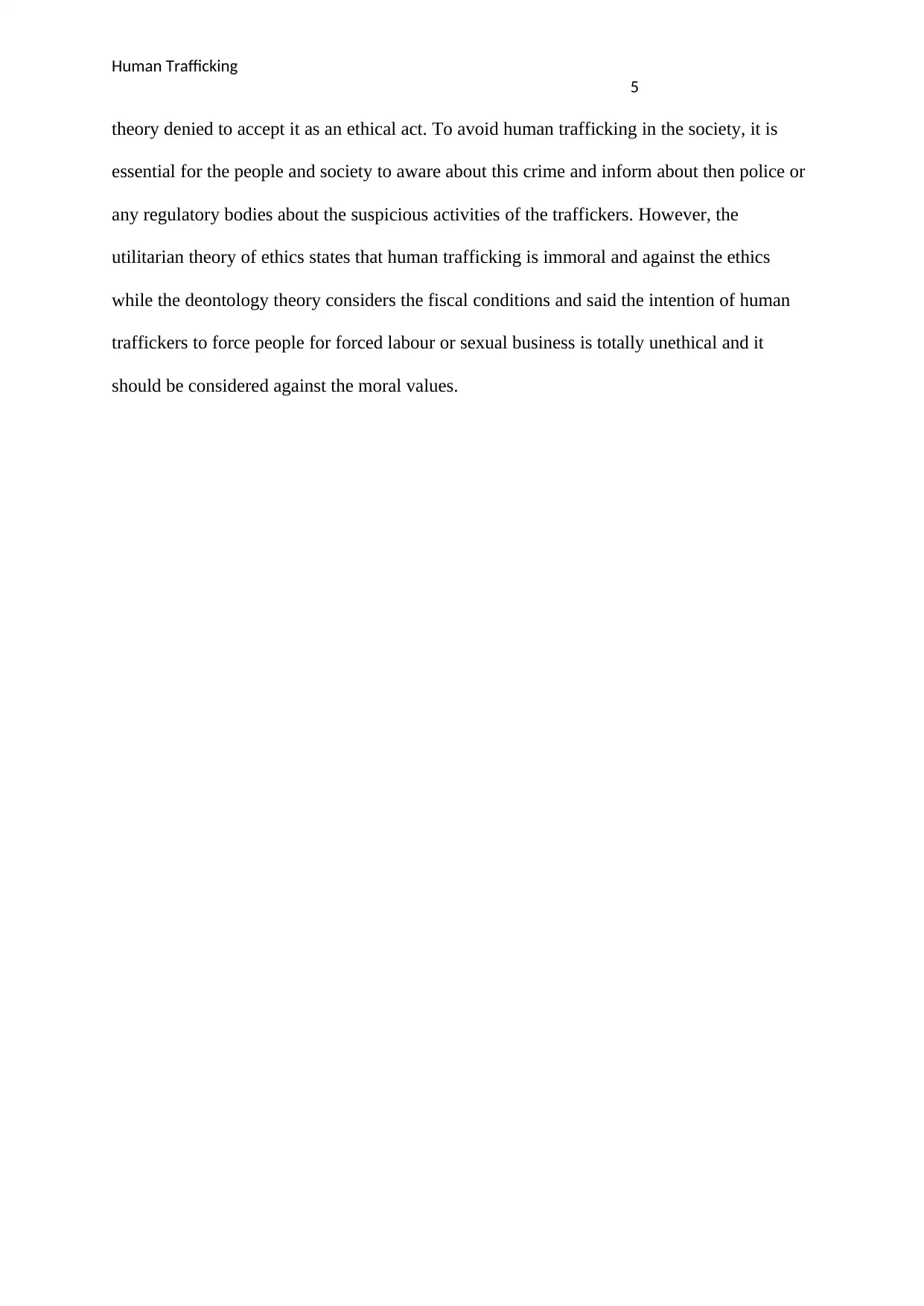
Human Trafficking
5
theory denied to accept it as an ethical act. To avoid human trafficking in the society, it is
essential for the people and society to aware about this crime and inform about then police or
any regulatory bodies about the suspicious activities of the traffickers. However, the
utilitarian theory of ethics states that human trafficking is immoral and against the ethics
while the deontology theory considers the fiscal conditions and said the intention of human
traffickers to force people for forced labour or sexual business is totally unethical and it
should be considered against the moral values.
5
theory denied to accept it as an ethical act. To avoid human trafficking in the society, it is
essential for the people and society to aware about this crime and inform about then police or
any regulatory bodies about the suspicious activities of the traffickers. However, the
utilitarian theory of ethics states that human trafficking is immoral and against the ethics
while the deontology theory considers the fiscal conditions and said the intention of human
traffickers to force people for forced labour or sexual business is totally unethical and it
should be considered against the moral values.
⊘ This is a preview!⊘
Do you want full access?
Subscribe today to unlock all pages.

Trusted by 1+ million students worldwide
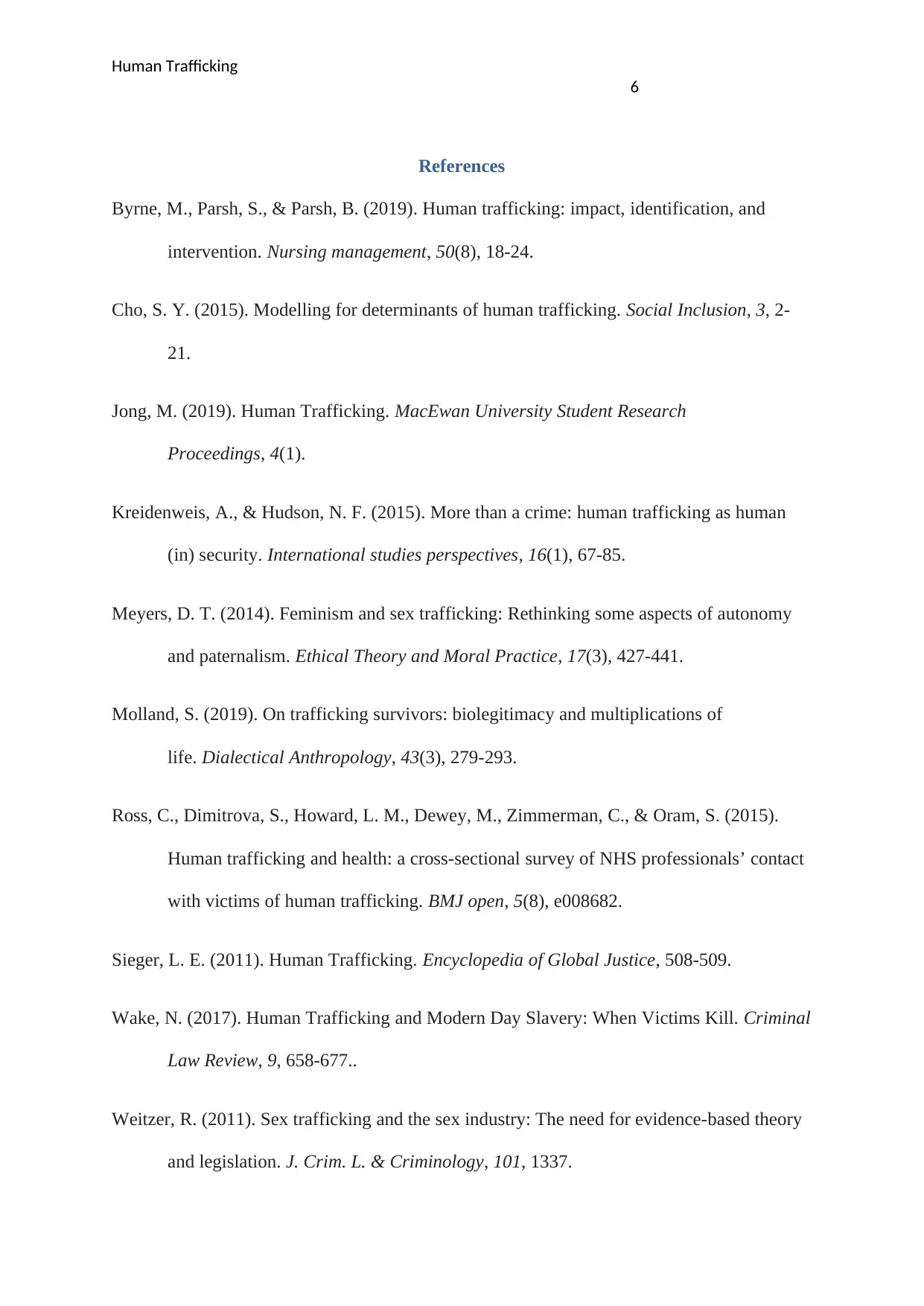
Human Trafficking
6
References
Byrne, M., Parsh, S., & Parsh, B. (2019). Human trafficking: impact, identification, and
intervention. Nursing management, 50(8), 18-24.
Cho, S. Y. (2015). Modelling for determinants of human trafficking. Social Inclusion, 3, 2-
21.
Jong, M. (2019). Human Trafficking. MacEwan University Student Research
Proceedings, 4(1).
Kreidenweis, A., & Hudson, N. F. (2015). More than a crime: human trafficking as human
(in) security. International studies perspectives, 16(1), 67-85.
Meyers, D. T. (2014). Feminism and sex trafficking: Rethinking some aspects of autonomy
and paternalism. Ethical Theory and Moral Practice, 17(3), 427-441.
Molland, S. (2019). On trafficking survivors: biolegitimacy and multiplications of
life. Dialectical Anthropology, 43(3), 279-293.
Ross, C., Dimitrova, S., Howard, L. M., Dewey, M., Zimmerman, C., & Oram, S. (2015).
Human trafficking and health: a cross-sectional survey of NHS professionals’ contact
with victims of human trafficking. BMJ open, 5(8), e008682.
Sieger, L. E. (2011). Human Trafficking. Encyclopedia of Global Justice, 508-509.
Wake, N. (2017). Human Trafficking and Modern Day Slavery: When Victims Kill. Criminal
Law Review, 9, 658-677..
Weitzer, R. (2011). Sex trafficking and the sex industry: The need for evidence-based theory
and legislation. J. Crim. L. & Criminology, 101, 1337.
6
References
Byrne, M., Parsh, S., & Parsh, B. (2019). Human trafficking: impact, identification, and
intervention. Nursing management, 50(8), 18-24.
Cho, S. Y. (2015). Modelling for determinants of human trafficking. Social Inclusion, 3, 2-
21.
Jong, M. (2019). Human Trafficking. MacEwan University Student Research
Proceedings, 4(1).
Kreidenweis, A., & Hudson, N. F. (2015). More than a crime: human trafficking as human
(in) security. International studies perspectives, 16(1), 67-85.
Meyers, D. T. (2014). Feminism and sex trafficking: Rethinking some aspects of autonomy
and paternalism. Ethical Theory and Moral Practice, 17(3), 427-441.
Molland, S. (2019). On trafficking survivors: biolegitimacy and multiplications of
life. Dialectical Anthropology, 43(3), 279-293.
Ross, C., Dimitrova, S., Howard, L. M., Dewey, M., Zimmerman, C., & Oram, S. (2015).
Human trafficking and health: a cross-sectional survey of NHS professionals’ contact
with victims of human trafficking. BMJ open, 5(8), e008682.
Sieger, L. E. (2011). Human Trafficking. Encyclopedia of Global Justice, 508-509.
Wake, N. (2017). Human Trafficking and Modern Day Slavery: When Victims Kill. Criminal
Law Review, 9, 658-677..
Weitzer, R. (2011). Sex trafficking and the sex industry: The need for evidence-based theory
and legislation. J. Crim. L. & Criminology, 101, 1337.
Paraphrase This Document
Need a fresh take? Get an instant paraphrase of this document with our AI Paraphraser
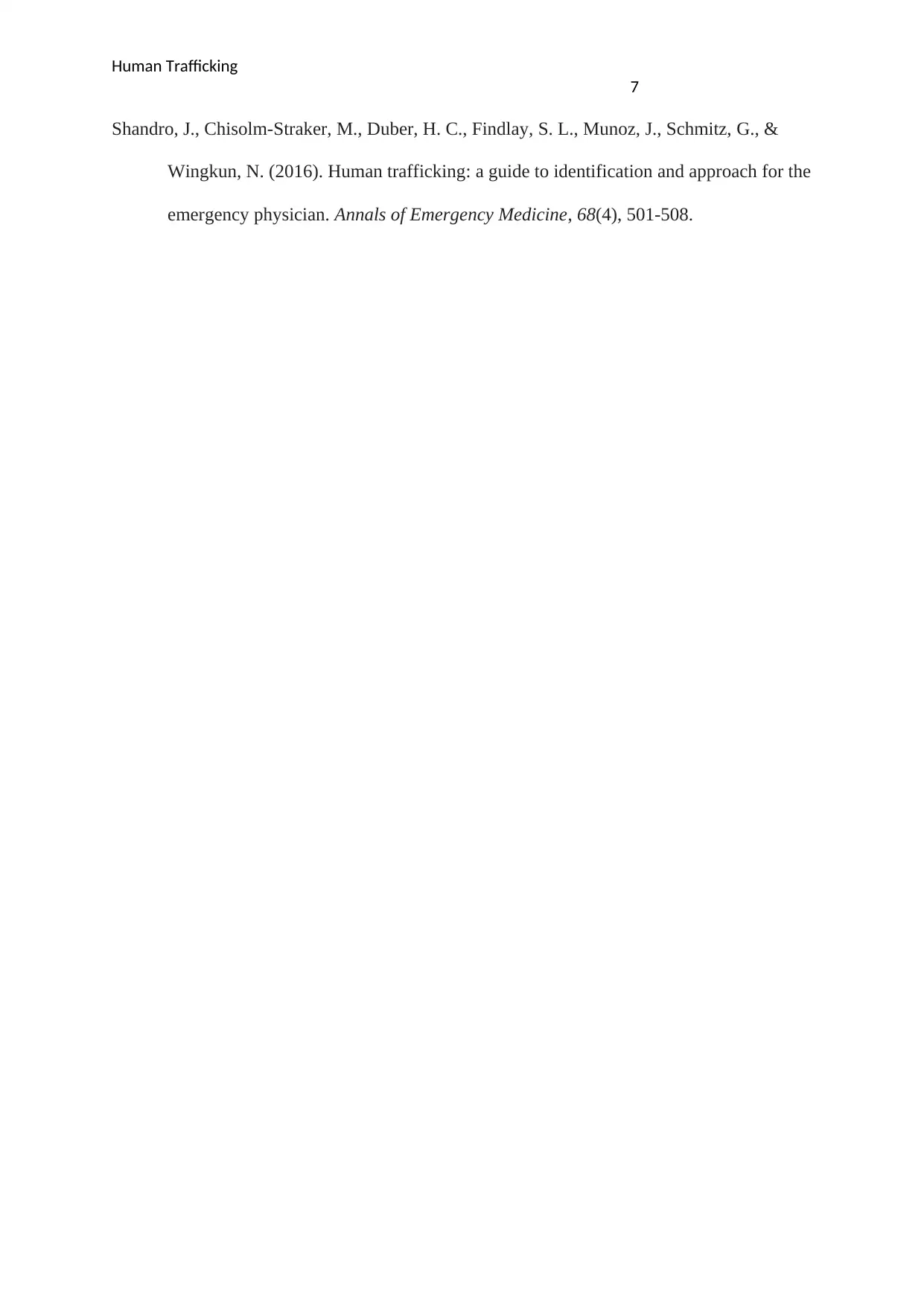
Human Trafficking
7
Shandro, J., Chisolm-Straker, M., Duber, H. C., Findlay, S. L., Munoz, J., Schmitz, G., &
Wingkun, N. (2016). Human trafficking: a guide to identification and approach for the
emergency physician. Annals of Emergency Medicine, 68(4), 501-508.
7
Shandro, J., Chisolm-Straker, M., Duber, H. C., Findlay, S. L., Munoz, J., Schmitz, G., &
Wingkun, N. (2016). Human trafficking: a guide to identification and approach for the
emergency physician. Annals of Emergency Medicine, 68(4), 501-508.
1 out of 8
Related Documents
Your All-in-One AI-Powered Toolkit for Academic Success.
+13062052269
info@desklib.com
Available 24*7 on WhatsApp / Email
![[object Object]](/_next/static/media/star-bottom.7253800d.svg)
Unlock your academic potential
Copyright © 2020–2026 A2Z Services. All Rights Reserved. Developed and managed by ZUCOL.





